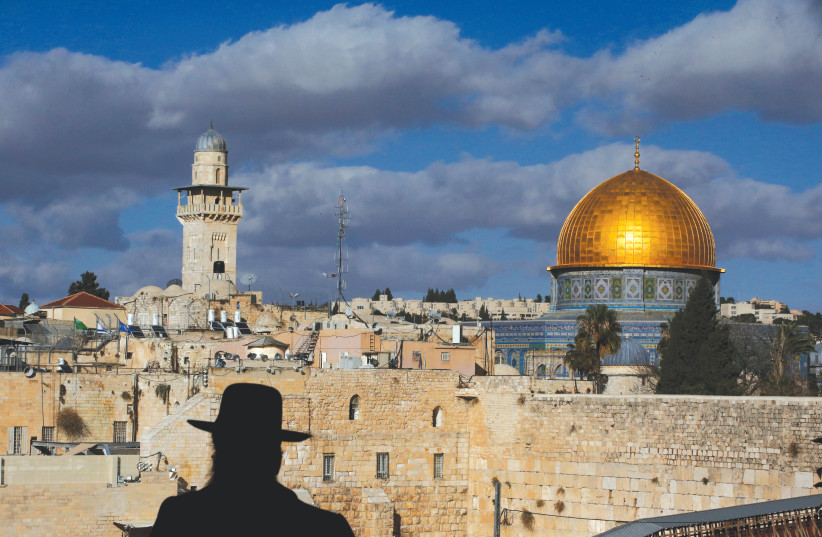by Marcy Oster
Over 1,600 Jews mark Tisha Be’av on the Temple Mount on Sunday following clashes between Muslim worshippers at Al-Aqsa Mosque and Israel Police.

On Saturday night, July 17, Jews around the world began commemorating Tisha Be’av. The solemn fast day observed on the ninth day of the month of Av in the Hebrew calendar marks the destruction of two Jewish temples in Jerusalem: The First Temple was destroyed by the Babylonians in 586 BCE, and the Second Temple by the Romans in 70 CE.
For more stories from The Media Line go to themedialine.org
In
Jewish tradition, the ninth of Av was a day of repeated tragedies,
generation after generation, beginning with the return of the 12 spies
Moses sent to scout out the land of Canaan before the Israelites entered
the land. Ten of the spies brought back an overly pessimistic report on
the chance of success, leading the Israelites to wander in the desert
for 40 years before being allowed to enter the land.
The
Bar Kokhba revolt against the Romans was defeated on the same date in
133 CE, and Roman commander Turnus Rufus plowed the Temple Mount on the
same date in 135 CE.
Other
tragic Jewish events that occurred on the ninth of Av include the start
of the First Crusade in 1096; the Jewish expulsion from Spain in 1492;
the approval for the Nazi’s Final Solution in 1941; and the start of
mass deportations of Jews from the Warsaw Ghetto in 1942.
Tisha
Be’av, which comes at the end of a three-week mourning period, is
observed with a 25-hour fast that includes prohibitions on eating and
drinking, washing and bathing, wearing leather shoes, and having marital
relations. Jews gather to chant the biblical Book of Lamentations, and
also recite kinot – elegies marking various tragedies that have occurred
throughout Jewish history. They sit in low chairs and often read these
texts by candlelight.
In
Israel, Jews gather at the Western Wall in the Old City of Jerusalem to
recite Lamentations and kinot, and some have a tradition of ascending
to the Temple Mount in order to mourn the destruction.
Over 1,600 Jews visited the Temple Mount on Sunday, following clashes on the holy site
between Muslim worshippers at al-Aqsa Mosque and Israeli police
officers over the arrival of the Jewish pilgrims. Muslim protesters
threw rocks from the mosque and chanted, “With our soul and blood, we
will redeem you, al-Aqsa.”
Following
clashes at the site, Israeli Prime Minister Naftali Bennett held a
situational assessment with Public Security Minister Omer Bar Lev and
Police Inspector General Yaakov Shabtai. Bennett “instructed that the
organized and safe visits by Jews to the Temple Mount continue, while
maintaining order at the site,” according to a statement from the Prime
Minister’s Office.
In
the wake of the visit by Jewish pilgrims to the Temple Mount/Al-Aqsa
compound, the Ra’am - United Arab List party, which is part of the
current government coalition, condemned the practice and said that the
site belongs to Muslims only.
“Al-Aqsa
Mosque, in its 144 dunams [35.6 acres], is solely the property of
Muslims, and no one else has any right to it,” Ra’am said in a joint
statement with the Islamic Movement.
The
statement condemned Israeli authorities that “allowed officials and
Knesset members to storm Al-Aqsa, perform prayers, perform religious
rituals, and recite the Israeli national anthem Hatikva in the
courtyards of the blessed Al-Aqsa Mosque.”
The
Kingdom of Jordan also condemned the visits, calling them “a violation
of the historical and legal status quo, international law, and Israel’s
obligations as an occupying power in east Jerusalem.”
The
violence comes after Hamas accused Israel of “playing with fire” in
allowing Jewish visits to the Temple Mount to mark Tisha Be’av. Hamas
called on Muslims to mass at the entrances to the Old City and
throughout Jerusalem to confront Israeli Jews and to protest the visits.
Hamas also called on residents of Gaza, which it controls, to “keep
their fingers on the trigger” to defend Jerusalem, also referencing the
upcoming possible evictions of Palestinian families from homes in the
Silwan and Sheikh Jarrah neighborhoods of east Jerusalem. This call
comes two months after cross-border violence between Israel and Hamas in
Gaza, sparked by the clashes in the Old City and the possible
evictions.
The
Islamic holiday of Eid al-Adha, the festival of the sacrifice that
commemorates Ibrahim’s near-sacrifice of his son Ishmael and that marks
the end of the annual hajj pilgrimage to Mecca, is also observed this
week, from Monday night through Friday. Hamas has called on all Muslims
to visit Al-Aqsa Mosque on the holiday.
The
Israeli Prime Minister’s Office released a statement on Sunday that
“Prime Minister Naftali Bennett … thanked the public security minister
and the Israel Police inspector general for managing the events on the
Temple Mount with responsibility and consideration, while maintaining
freedom of worship for Jews on the Mount. Prime Minister Bennett
emphasized that freedom of worship on the Temple Mount will be fully
preserved for Muslims as well, who will soon be marking the fast of the
Day of Arafah and the Eid al-Adha.”
Marcy Oster
Source: https://www.jpost.com/breaking-news/what-sparked-violence-on-jerusalems-temple-mount-today-explainer-674257
No comments:
Post a Comment